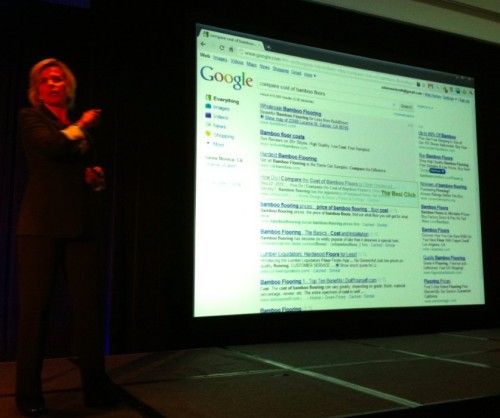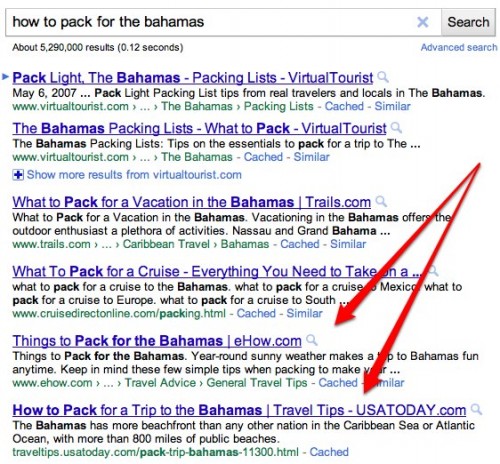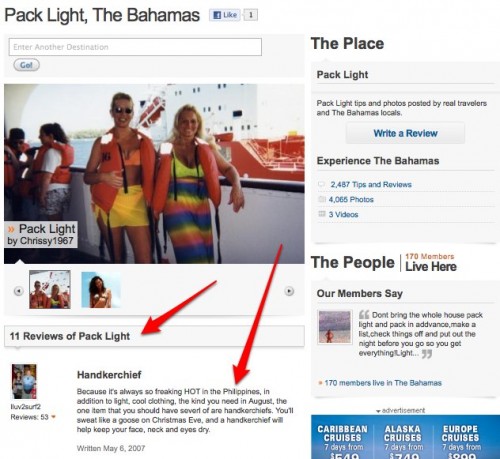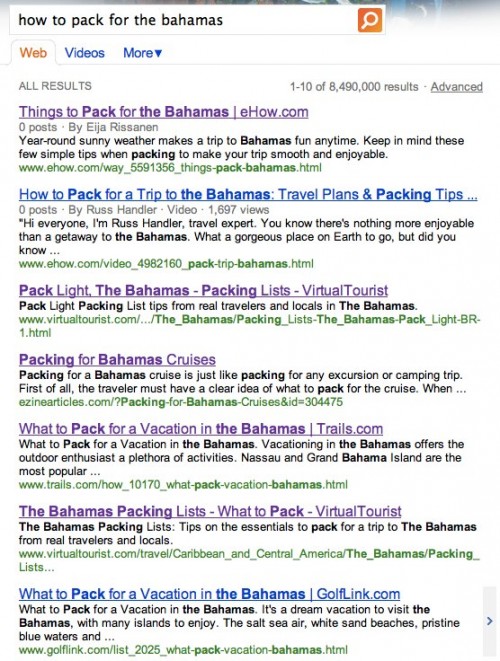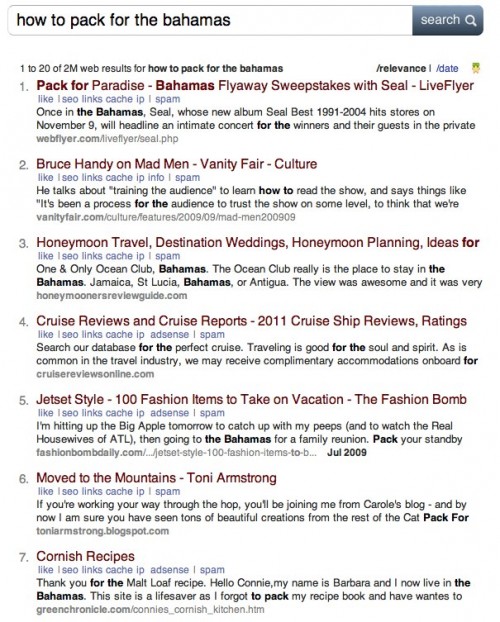Demand Media & Being “The Best Click” On Google
Demand Media’s success? Listening to what people want and generating great content to show up at Google. At least that’s part of it, said Demand’s chief revenue officer Joanne Bradford — and she came armed with screenshots and examples to prove it. Bradford’s illustrations came during a case study presentation, “Are You Really Listening,” at […]
Demand Media’s success? Listening to what people want and generating great content to show up at Google. At least that’s part of it, said Demand’s chief revenue officer Joanne Bradford — and she came armed with screenshots and examples to prove it.
Bradford’s illustrations came during a case study presentation, “Are You Really Listening,” at FM’s Signal LA event. My live blogging of her talk is below. I’ve added some analysis, as well.
Yes, Demand Tracks Bananas
Bradford starts off saying people buy lots of bananas, $1.05 billion of them per day (or maybe per year).
More people check into Demand’s Livestrong site to log food than to Foursquare.
Everyday, people scream signals at Demand Media of what they want, and Demand listens and responds. Three ways to reach people, search, social and apps.
Super Bowl Food Signals
Shows a real time map of foods being tracked by Livestrong across the US.
Seven layer dip went up 1,360% on Super Bowl Sunday than the previous Sunday. Beer went up 92%, wings 259% and Little Smokies went up 1,033%. If you’re a food marketer, this is data you want.
In each case, Demand gives the consumers the most important thing they want, the calories.
Back to bananas. Dole told Demand it wanted to know when people want bananas, where they’re looking and be the top banana [bad pun mine] for them. So Demand did keyword targeting of Dole ads into banana-related content.
Demand, Google & The Best Click
Bradford brings up a search on Google for compare cost of bamboo floors, a search she says has lots of noise for the marketer, noise in terms of the ads you can buy but how as a marketer, you want to be “The Best Click,” the number one unpaid listing on the page.
In the picture above, she’s highlighted where a page from Demand’s eHow site appears at the top for those results. Here’s a screenshot to show it more:
Google doesn’t just let you be there, Bradford says. You have to be good. She shows the article from eHow that is ranking number one, a great article she says she’s read:
Here’s a closer look at that page:
[Expect some close examination of this page and how good or poor people will argue it to be. I have a very, very quick look at the top results. Some are definitely worse. A few seem better. Some seem about the same.
Looking at the instructions above, only the first two actually relate to the answer and feel kind of like “well, duh.” Get quotes, with the density thing being about the only bamboo floor specific issue.
But the overall point is that people are clearly searching for an answer to this type of question — and Demand is watching that and putting out something, in a topic where there’s clearly no flood of outstanding material that it is somehow usurping].
Bradford says Demand wants everyone hitting a Demand site to be more confident and successful in whatever they do.
Now she shifts to talk about vacations. If people search for how to pack for Bahamas, Demand has article distributed to USA Today that answers exactly what you need.
Not “how to pack” Bradford stresses but “how to pack for the Bahamas” — did you know you need a passport to get back to the US from there? That’s something of the detail they get into. Writers were all vetted by USA Today. This article not only helped the consumer but was found and discoverable.
That was the end of Bradford’s talk. Here’s a closer look at that Demand page on USA Today:
Again, there’s a lot of “well duh” instructions here. Pack sunscreen? Pack extra batteries? The passport and currency exchange stuff is specific to the Bahamas, but that’s the minority of the content. And what’s missing — are there things forbidden to bring into the Bahamas that an American traveler might not be considering, when they pack?
Interestingly, Demand’s eHow has its own page (one of several actually) on the same topic — with less information — that still outranks the Demand-written page that’s on USA Today:
Again, I expect there will be some close examination of both of these Demand examples. But again, while I have the same “well duh” feeling that I know many might, what’s being “pushed out,” if anything, I don’t know. I do know that flipping through some of the other results, nothing wonderful jumped out. Indeed, the number one thing Google lists:
I don’t know what the hell this is. Is it a review of a hotel called “Pack Light” in the Bahamas, as the text one of the arrows points to suggests. I doubt it — because I did some searching, and there seems to be no such locaiton.
The second arrow points to the top listed tip. Pack a handkerchief because it’s so hot in the Philippines. When did the Philippines and the Bahamas merge?
I’ll tell you the one thing I noticed in my quick run through most of these sites showing up for this very niche search, on Google. About half of them had Google ads — highlighting how Google itself helps fund some of the noise that people sometimes feel these “how do I” type of pages are.
By the way, Bing’s results don’t much different than Google’s:
And for anyone who believes that killing off the “content farms” would make results better, I give Blekko, which recently started blocking many answer sites/content farms that users there consider spam. Demand’s eHow is one of those. The content farm free results:
Yeah, nothing leaps out to say removing those sites have made the results better. I particularly like the “Cornish Recipes” site that shows up at the end of this search on “how to pack for the bahamas.”
Bottom line. It’s easy to demonize content farms as ruining results. Certainly in plenty of cases, they don’t appear to add much value. But certainly in plenty of cases, no one may be adding value. The real question is, will sites step up to provide really outstanding content and be rewarded by the search engines — and in turn, make searchers feel results are getting better, not noisier or worse.
See also from the event, Mahalo’s Calacanis: Time To End The Content Farm Arms Race as well as these past articles from Search Engine Land:
Contributing authors are invited to create content for Search Engine Land and are chosen for their expertise and contribution to the search community. Our contributors work under the oversight of the editorial staff and contributions are checked for quality and relevance to our readers. The opinions they express are their own.
Related stories
New on Search Engine Land
